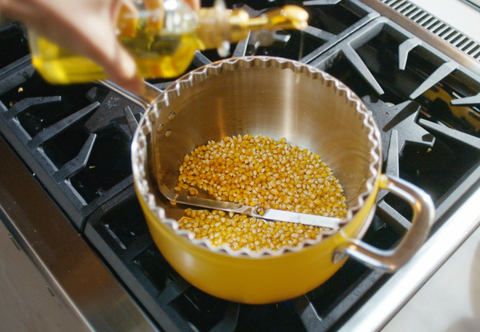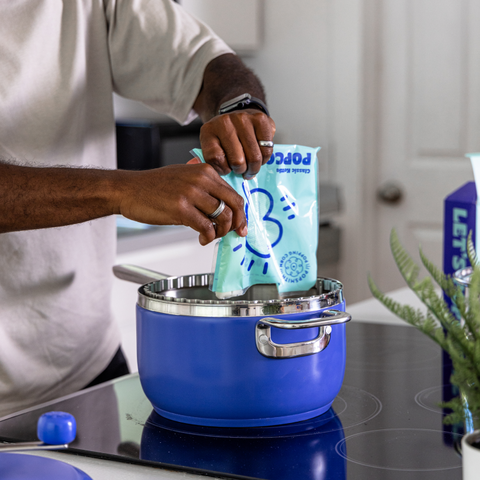So many of us have popcorn kernels in our cupboards, ready to pop any day of the week. Popcorn is inexpensive, versatile, and also pretty healthy. There are so many reasons to love popcorn!
When you think about popcorn, movie theater popcorn may be the first thing to come to your mind. This popcorn is often popped in high-fat oils and then slathered in butter and salt. It's not the most nutritious snack if we're being honest.
However, popcorn isn’t usually unhealthy.
In this blog post, we're going to go over the many health benefits of popcorn, check out the calorie count in different types of popcorn, and gather all the nutritional information you may need so you can enjoy your favorite snack.
Check it out:
How Many Calories Are in Different Types of Popcorn?
Calorie count can actually vary for different types of popcorn. A lot depends on how the popcorn is seasoned and prepared. Popcorn popped in oil will obviously have more calories than air-popped popcorn.
The number of calories in popcorn will also vary from brand to brand. Pre-packaged popcorn will differ depending on the ingredients each company uses.
We know — this is a lot to think about. But here's a guide that will give you a general idea about the calories in popcorn:
Air-Popped Popcorn
Air-popped popcorn is healthiest popcorn you can make. It relies on hot air to pop the kernels rather than oil. This means there is more nutritional value and fewer calories in each serving.
A three-cup serving of air-popped popcorn has:
- 93 calories
- 3 grams of protein
- 18.6 grams of carbohydrates
- 1 gram of fat
- 3.5 grams of fiber
Eating air popped popcorn while it's warm is the best way to get the most out of this healthy snack. If you want to add toppings or any seasoning, just be sure they're also healthy and in line with your dietary requirements.
Microwave Popcorn
Microwave popcorn is one of the most popular types of popcorn. You can find it in pretty much any grocery store. It's also inexpensive and easy to make. All you need to do is put the bag in the microwave and press start.
But this convenience comes at a price. Compared to other kinds of popcorn, microwave popcorn usually has higher amounts of trans fats and cholesterol.
Here's a quick look at what is in a three-cup serving of an average bag of microwave popcorn:
- 213 calories
- 3 grams protein
- 15 grams of carbohydrates
- 15 grams of fat
- 3.4 grams of fiber
Now while microwave popcorn isn’t as healthy as air-popped popcorn, it's still a good snack option. It's pretty low in carbs and has fewer calories than a lot of other snacks on the market.
Oil-Popped Stovetop Popcorn

Oil-popped stovetop popcorn is great because it's so customizable. You can add any toppings and use any type of oil you like. This is great if you're looking to have more control over your food.
It's tricky to say exactly how many calories, protein, and carbs are in stovetop popcorn since everyone will use different oils.
However, we can give you a tip to keep the popcorn healthy — use lower calorie oils like coconut oil, avocado, oil or olive oil to make your popcorn. Canola and vegetable oil are also good choices but they tend to be more processed.
FUN FACT: One serving of Popsmith's Oh Sooo Buttery Popcorn is 140 calories, while a serving of our Classic Kettle Popcorn is 120 calories.
Does Popcorn Have Any Health Benefits?

Popcorn has tons of health benefits. It's a healthy snack when enjoyed in moderation. Popcorn is generally low in calories, high in fiber, and is a good source of antioxidants and vitamins. Let’s take a closer look at all the details:
Great Source of Antioxidants
Antioxidants are molecules that help fight free radicals in your body. Foods that are high in antioxidants will help your body keep thos free radicals in check and improve your overall health. Popcorn is high in an antioxidant called polyphenol. Polyphenol will help protect your cells from damage making it a fantastic snack.
Consuming a good amount of polyphenols can also help with blood circulation, digestive health and reduce the risk of cancer. That means that eating your favorite popcorn snack can actually help you live a healthier life!
High in Dietary Fiber

Dietary fiber is an important part of your daily diet. You need fiber to help with overall gut health and keep your system regular. It can even aid in weight loss. The recommended daily amount of fiber is 25 grams for women and 38 grams for men.
Popcorn is made from corn which is naturally high in fiber. A 100 gram serving of popcorn has about 15 grams of fiber. Just another reason why popcorn should be one of your favorite snacks ever!
High in Vitamins and Minerals
You may be surprised to find that popcorn is full of vitamins and minerals. One 100 gram serving of air popped popcorn contains the following:
- Vitamin B1 (Thiamin): 7% of your recommended daily value.
- Vitamin B3 (Niacin): 12% of your recommended daily value.
- Vitamin B6 (Pyridoxine): 8% of your recommended daily value.
- Iron: 18% of your recommended daily value.
- Magnesium: 36% of your recommended daily value.
- Phosphorus: 36% of your recommended daily value.
- Potassium: 9% of your recommended daily value.
- Zinc: 21% of your recommended daily value.
- Copper: 13% of your recommended daily value.
- Manganese: 56% of your recommended daily value.
Pretty impressive, right?! It's amazing how many health benefits you can find in a bowl of simple popcorn.
Learn More About This Popular Snack with Popsmith
Popcorn is quite a healthy snack and can be an amazing, beneficial part of any diet. You can learn a lot more about popcorn with us here at Popsmith. We have so much information about popcorn that it is unbelievable! Be sure to check back often for more popcorn recipes, educational articles, and snacking inspiration. Now, go make yourself a big bowl of your favorite popped snack — you deserve it!
FAQs About Popcorn Nutrition
Is popcorn a good snack for weight loss?
Popcorn can be a very good snack for weight loss. It's high in dietary fiber and also has a low-calorie count. Be sure to avoid popcorn with overly salty seasonings or extra buttery toppings which can definitely decrease the nutritional value of this healthy snack.
What is considered a single serving of popcorn?
One serving of popcorn is about 4-5 cups of popped popcorn. You can get a serving of popcorn from two tablespoons of unpopped popcorn kernels. It is quite easy to eat popcorn by the handful, but, if you are looking to eat only a serving size, stick to this amount.
Does popcorn increase the risk of heart disease?
Popcorn is high in fiber and is also a whole-grain food. This has actually been linked to reducing the risk of heart disease, rather than increasing it.
What are the healthiest oils and seasonings to add to popcorn?
There are quite a few options when it comes to adding flavorings to popcorn. Some of the best low calorie oil include coconut oil, olive oil, and avocado oil. These are all full of healthy fats.
When it comes to toppings, a small amount of salt is always a classic choice. You can also use nutritional yeast, chili powder, garlic powder or curry powder to add a lot of flavor without sacrificing health benefits.

![Floating yellow popper and popcorn kits on a cream background with two boxes of popcorn kits in buttery and kettle corn flavor. [42751631294657]](http://popsmith.com/cdn/shop/files/BUTTER_BUNDLE_COMBO_PDP_v13.jpg?v=1696538677)


